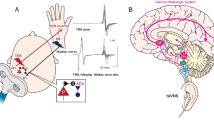Abstract
The effect of the nitroimidazoles misonidazole, Ro-05-9963, RGW-608 and metronidazole on nerve conduction velocity (NCV) were measured in the anaesthetized mouse. The compounds were administered by i.p. injection either as a single dose of 1 mg/g (only 0.5 mg/g for RGW-608) or in 36 fractions of 0.15 mg/g over 18 days (only 4 fractions in 2 days for RGW-608). After single doses a reduction in nerve conduction velocity was seen with all the compounds except metronidazole, which had no significant effect. During chronic exposure, a reduction in NCV occurred towards the end of the course of injections. All compounds produced an effect, although RGW-608 was the most neurotoxic, giving the largest reduction in NCV after only 4 injections. After the end of chronic exposure to misonidazole, Ro-05-9963 and metronidazole, recovery to normal took 2-3 weeks.
This is a preview of subscription content, access via your institution
Access options
Subscribe to this journal
Receive 24 print issues and online access
$259.00 per year
only $10.79 per issue
Buy this article
- Purchase on Springer Link
- Instant access to full article PDF
Prices may be subject to local taxes which are calculated during checkout
Similar content being viewed by others
Rights and permissions
About this article
Cite this article
Hirst, D., Vojnovic, B. & Hobson, B. Changes in nerve conduction velocity in the mouse after acute and chronic administration of nitroimidazoles. Br J Cancer 39, 159–167 (1979). https://doi.org/10.1038/bjc.1979.26
Issue Date:
DOI: https://doi.org/10.1038/bjc.1979.26



